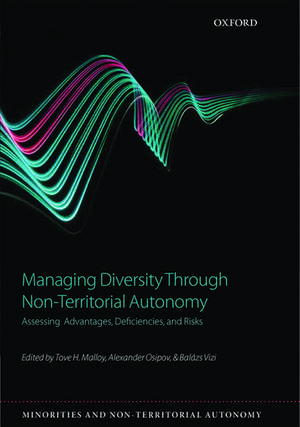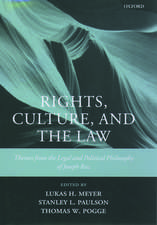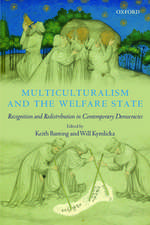Managing Diversity through Non-Territorial Autonomy: Assessing Advantages, Deficiencies, and Risks: Minorities & Non-territorial Autonomy
Editat de Tove H. Malloy, Alexander Osipov, Balázs Vizien Limba Engleză Hardback – 23 iul 2015
Preț: 703.08 lei
Preț vechi: 1008.35 lei
-30% Nou
Puncte Express: 1055
Preț estimativ în valută:
134.60€ • 140.44$ • 112.83£
134.60€ • 140.44$ • 112.83£
Carte tipărită la comandă
Livrare economică 03-08 martie
Preluare comenzi: 021 569.72.76
Specificații
ISBN-13: 9780198738459
ISBN-10: 0198738455
Pagini: 338
Dimensiuni: 162 x 240 x 26 mm
Greutate: 0.65 kg
Editura: OUP OXFORD
Colecția OUP Oxford
Seria Minorities & Non-territorial Autonomy
Locul publicării:Oxford, United Kingdom
ISBN-10: 0198738455
Pagini: 338
Dimensiuni: 162 x 240 x 26 mm
Greutate: 0.65 kg
Editura: OUP OXFORD
Colecția OUP Oxford
Seria Minorities & Non-territorial Autonomy
Locul publicării:Oxford, United Kingdom
Recenzii
[The book] offers a very interesting introduction to the concept of non-territorial autonomy and presents a large number of interesting case studies from Europe and North America, demonstrating that a wide variety of arrangements, as well as policies, might result from it ... The book also contributes significantly to bringing more scientific focus on the concept of non-territorial autonomy ... It should represent a very useful guide not only for those interested in scientific research of non-territorial autonomy, but also policy-makers interested in designing such autonomous arrangements ... The whole book, representing a fairly thorough study of the concept of non-territorial autonomy, surely merits a place on the bookshelf of those interested in increasing their knowledge in this field of study.
Notă biografică
Tove H. Malloy is Director of the European Centre for Minority Issues in Flensburg, Germany. She teaches at the Europa-University, Flensburg. She holds a PhD in political theory and specializes in the political and legal aspects of national and ethnic minority rights in International Law and International Relations, especially in the European context. She is currently a member of the Advisory Committee on the European Framework Convention for the Protection of National Minorities, elected by the Committee of Ministers of the Council of Europe in respect of Denmark. She is the author of National Minority Rights in Europe (OUP, 2005) as well as several edited books and numerous articles. Her main research interests include minority citizenship, agonistic democracy, ethno-ecologism, minority indicators, and inter-sectional discrimination. In addition to her academic career, Malloy has served as a diplomat in the Danish Foreign Service. Alexander Osipov is a Senior Research Associate of the European Centre for Minority Issues (Flensburg, Germany) and the head of ECMI's Justice & Governance Cluster. He is a historian, sociologist, and lawyer by background. Currently his research interests include ethnic and racial discrimination, non-territorial autonomy, and models of diversity policies. He is also conducting research on post-communist transformation in Belarus, Ukraine and Moldova. He previosly worked in a human right organization and carried out a number of research and human rights advocacy projects in Russia. Balázs Vizi is a lawyer and holds a PhD in political science. He has specialized in international human and minority rights protection. He is senior researcher at the Institute for Minority Studies, Centre for Social Science of the Hungarian Academy of Sciences, and an Associate Professor at the Department of International and European Law of the National University of Public Service (Budapest). He is a senior non-resident researcher of the European Centre for Minority Issues. He is author of several publications on minority issues in the context of the European Union and co-editor of several books on minority rights protection. His main research interest cover the political and linguistic rights of minorities, minority issues, European integration, and citizenship policies.














